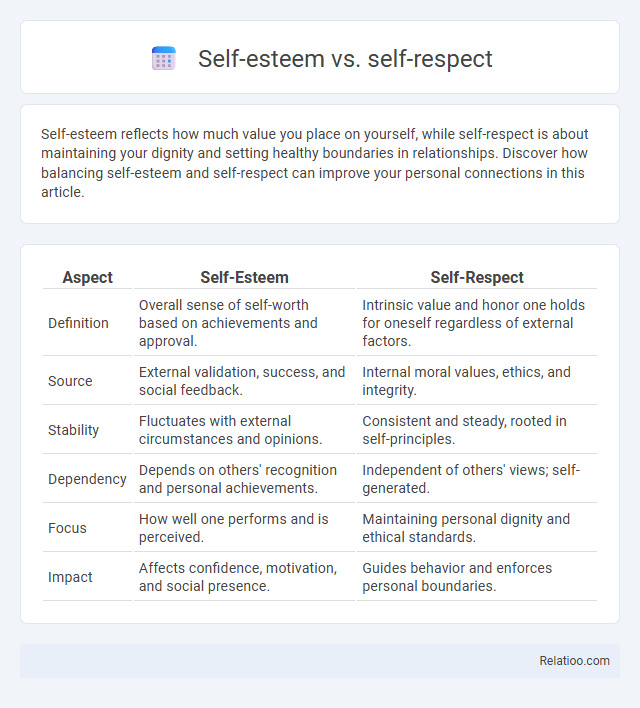Self-esteem reflects how much value you place on yourself, while self-respect is about maintaining your dignity and setting healthy boundaries in relationships. Discover how balancing self-esteem and self-respect can improve your personal connections in this article.
Table of Comparison
| Aspect | Self-Esteem | Self-Respect |
|---|---|---|
| Definition | Overall sense of self-worth based on achievements and approval. | Intrinsic value and honor one holds for oneself regardless of external factors. |
| Source | External validation, success, and social feedback. | Internal moral values, ethics, and integrity. |
| Stability | Fluctuates with external circumstances and opinions. | Consistent and steady, rooted in self-principles. |
| Dependency | Depends on others' recognition and personal achievements. | Independent of others' views; self-generated. |
| Focus | How well one performs and is perceived. | Maintaining personal dignity and ethical standards. |
| Impact | Affects confidence, motivation, and social presence. | Guides behavior and enforces personal boundaries. |
Understanding Self-Esteem and Self-Respect
Self-esteem reflects Your overall evaluation of personal worth, influenced by successes and social feedback, while self-respect centers on maintaining inner dignity and ethical standards regardless of external validation. Recognizing the distinction between these concepts helps address core needs for acceptance and integrity, fostering healthier psychological well-being. Balancing self-esteem and self-respect empowers you to build confidence rooted in authentic values rather than contingent approval.
Key Differences Between Self-Esteem and Self-Respect
Self-esteem reflects an individual's overall evaluation of their own worth based on achievements and external validation, while self-respect centers on honoring personal values and maintaining dignity regardless of circumstances. Unlike self-esteem, self-respect is more stable and less influenced by external opinions, rooted in consistent adherence to one's moral principles. Needs are fundamental requirements that influence both self-esteem and self-respect; fulfilling basic needs supports healthy self-esteem, whereas respecting oneself ensures those needs are met without compromising integrity.
The Origins of Self-Esteem
The origins of self-esteem stem from internal validation and the fulfillment of essential psychological needs such as belonging, competence, and autonomy. Unlike self-respect, which is grounded in adherence to personal values and ethical standards, self-esteem fluctuates based on external feedback and perceived social acceptance. Understanding your needs and how they impact your self-esteem is crucial for building genuine confidence and emotional resilience.
The Foundations of Self-Respect
The foundations of self-respect stem from setting personal boundaries, honoring one's values, and maintaining integrity in actions and decisions. Unlike self-esteem, which depends on external validation, self-respect originates internally by recognizing one's inherent worth and refusing acceptance of mistreatment. Meeting basic psychological and emotional needs supports self-respect by fostering autonomy, competence, and belonging, crucial for a balanced self-identity.
External Validation vs Internal Values
Self-esteem often hinges on external validation, reflecting how others perceive us, while self-respect is grounded in adherence to internal values and personal integrity. Needs can drive behavior based on both external approval and internal fulfillment, highlighting the tension between seeking acceptance and maintaining authentic self-worth. Developing self-respect strengthens resilience against the fluctuations of external validation, fostering a stable sense of identity aligned with core beliefs.
How Self-Esteem Impacts Daily Life
Self-esteem directly influences your confidence, decision-making, and resilience in daily life, shaping how you interact with others and handle challenges. While self-respect derives from living according to your values, self-esteem reflects your overall sense of self-worth based on your achievements and feedback from your environment. Fulfilling your needs nurtures healthy self-esteem, enabling you to pursue goals with greater motivation and emotional stability.
How Self-Respect Shapes Decision Making
Self-respect serves as a critical foundation in shaping decision-making by ensuring that your choices align with your core values and personal boundaries. Unlike self-esteem, which fluctuates based on external validation, self-respect remains steady, guiding you to prioritize your needs without compromising integrity. This internal compass helps maintain balance between fulfilling needs and preserving your dignity in every decision you make.
Building Healthy Self-Esteem
Building healthy self-esteem involves recognizing the difference between self-esteem, self-respect, and personal needs; self-esteem reflects your overall sense of worth, self-respect is the regard you hold for yourself by maintaining boundaries, and needs are essential requirements for well-being. Prioritizing self-respect by honoring your values and setting limits supports genuine self-esteem, while fulfilling core needs such as emotional security and social connection prevents feelings of inadequacy. Cultivating a balanced approach ensures a resilient self-image grounded in realistic self-assessment and personal integrity.
Cultivating Genuine Self-Respect
Cultivating genuine self-respect involves recognizing and honoring one's intrinsic values and boundaries without seeking external validation, distinguishing it from self-esteem, which often depends on achievements and approval from others. While self-esteem fluctuates based on success or failure, self-respect remains stable by aligning actions with personal ethics and fundamental needs such as authenticity, integrity, and emotional well-being. Prioritizing these core needs fosters a resilient sense of self-respect that supports mental health and empowers consistent decision-making in challenging situations.
Balancing Self-Esteem and Self-Respect for Personal Growth
Balancing self-esteem and self-respect is essential for personal growth, as self-esteem reflects one's overall sense of worth, while self-respect involves maintaining integrity and boundaries aligned with core values. Meeting fundamental needs such as emotional security and acceptance supports healthy self-esteem, whereas upholding self-respect requires making choices that honor one's principles even in challenging situations. Effective personal development involves nurturing self-esteem through positive self-perception and reinforcing self-respect by setting limits that protect well-being and foster authentic relationships.

Infographic: Self-esteem vs Self-respect
 relatioo.com
relatioo.com